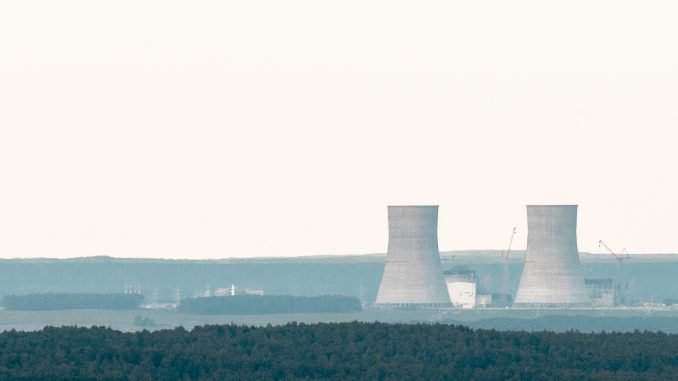
Astravets is a small town in the western part of Belarus. The name became familiar as a location of the first nuclear power plant built in Belarus. In fact, it’s a Russian built plant constructed by Russia’s State Atomic Energy Corporation, Rosatom. For varying reasons, the project has been controversial from the very beginning, Ambassador Andrei Sannikov, leader of European Belarus Campaign, wrote.
It is viewed not as an energy project but as a political and geopolitical one, aimed at increasing Belarus’ dependence on Russia.
The plant is built near Belarus’ border with the European Union, in a dangerous vicinity, just 45 km, from the Lithuanian capital, Vilnius. Any serious accident at the plant, will affect not only Belarus but also neighboring territories in Europe.

There little in the way of transparency about the project, and neither Russia or Belarus have released information about irregularities that occurred during the construction.
There are claims that several international agreements have been violated by the plant’s construction, for example the Convention on Nuclear Safety, the Espoo and Aarhus Conventions.
Concerns about the construction and safety of the Astravets nuclear power plant have been dramatically worsened by the erratic behavior of the Belarusian authorities during the current coronavirus pandemic.
Lukashenka’s failure to address the pandemic in Belarus may foreshadow the sort of reaction that we might expected from him if something were to happen at Astravets.
From the very beginning of the coronavirus pandemic, Lukashenka took a very aggressive position in denying its existence. He never changed his general policy, although his arguments kept changing: first he blamed a western conspiracy aimed at changing the world order, then it was just a overreaction and “panic” over what he called a “mild flu”, then it was a “hoax” distributed through social networks, bloggers and independent media that were to face bans and punishment.
To prove himself correct, Lukashenka invited a WHO mission to study the situation in Belarus. The mission arrived at the beginning of April, and after a week of work left with severeal concerns. Before leaving, they gave a press conference at which they expressed their worries with regards to the COVID-19 situation in Belarus.
The mission did an excellent job of monitoring the situation, and later issued its conclusions, repeating its concerns and providing recommendations that directly conflict with the official policy of the government in Belarus.
Without an official reaction to the WHO mission’s conclusions, it was apparently not what Lukashenka had expected.
Belarus’ ruler continues to maniacally deny the dangers of the pandemic with outrageous claims that no citizen will die of because of it in Belarus.
At the same time, Lukashenka is demonstrating that he personally has no fear of the virus, and is regularly seen at public events, playing hockey, visiting factories and church, going to “subbotnik” (a day of volunteer unpaid labour). However, as can be seen in official photos, there is always a considerable distance between Lukashenka and those to whom he is speaking. He is alone at the microphone and in the distance, there are crowds of others standing very close to each other.
Despite the very responsible position of the leaders of both the orthodox and catholic churches, who called on their members not to attend services at Easter, Lukashenka contradicted them by urging people to attend church services.
Lukashenka’s natural reaction during the pandemic, is to engage in disinformation, fabrications and manipulation in order to hide the truth about COVID-19 cases and deaths in Belarus. State officials and organs are instructed not to release any information connected with the coronavirus.
In the meantime, the COVID-19 situation has become extremely serious and is created even more concern internationally: statements have been issued in this regard from the European Commission, WHO and UN office in Belarus.
The behavior of Lukashenka, his government and state-controlled media are very similar to the behaviour of Soviet authorities during the Chernobyl disaster.
The same kind of general denial and attempts to cover up the scale of the disaster, the same lies and the deliberate exposure of people to the obvious dangers of the virus. During the Chernobyl disaster, which happened on April 26, 1986, the party leadership in Minsk and Kyiv, and other cities, organized May 1st demonstrations, which exposed thousands of people, unnecessarily, to dangerously high levels of radiation, considered lethally high at that time.
Today in Belarus, Lukashenka’s regime is deliberately expose people to COVID-19.
The insane behavior of the authorities, clearly demonstrates the dangers of the Astravets NPP.
From the very beginning, the Astravets nuclear project became known for its lack of transparency. There were numerous accidents, involving both equipment and workers. The safety of the equipment is in doubt, as it is not known whether the damaged parts of the plant, such as the reactor vessel, were replaced or whether it is still damaged.
Nuclear safety is an international issue. If something happens at the nuclear power station in Belarus it will inevitably affect the whole continent and beyond. It could cause severe damage and vast loss of life, in the most densely populated region of the world.
Given Lukashenka’s dangerously cavalier attitude towards the global pandemic, there is no doubt that he will demonstrate the same attitude in the case of a nuclear accident at Astravets.
It is still not too late for the EU to take serious measures – political, economic, financial – to deal with this dangerous Kremlin project in Belarus and support Lithuania official position and Belarusian civil society in their efforts to raise awareness of the problem and avoid potential catastophe.
Ambassador Andrei Sannikov
Leader of European Belarus Campaign
Former Deputy Foreign Minister of Belarus
Presidential Candidate in 2010
Former political prisoner

Be the first to comment